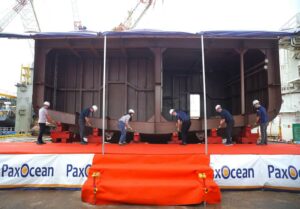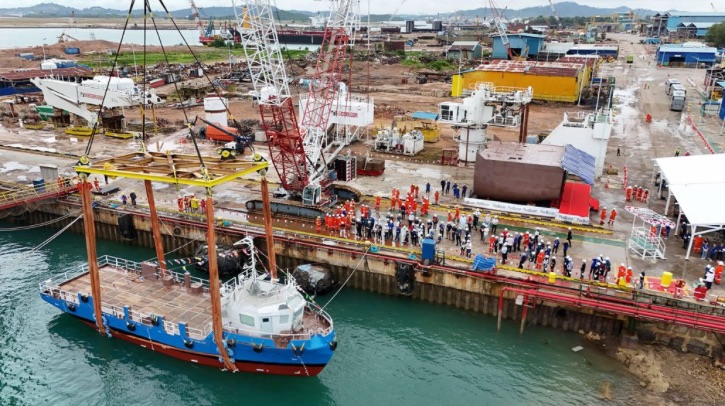At PaxOcean Batam shipyard in Singapore, the Coastal Sustainability Alliance (CSA) has launched its first fully electric supply boat (e-supply boat) and keel laid its first fully electric tug.
These electric vessels are said to be among the first and largest local electric harbor craft designed for operations in Singapore’s waters. The e-supply boat is launched ahead of the nation’s goal for all new harbor craft to be fully electric or compatible with net-zero fuels by 2030.
PXO-EXL-1 electric supply boat
As the electric supply boat has undergone design optimization and enhancement with MPA and the Institutes of Higher Learnings (IHLs)/ Research Institutes (RI), the vessel features improved energy efficiency for sustainable and viable coastal operations. The PXO-EXL-1 has also been dual-classed by Bureau Veritas (BV) and RINA.
The PXO-EXL-1 electric supply boat is capable of cruising at 8kts in zero-emission operations while maintaining operational reliability. Furthermore, the e-supply boat is designed with the operational insights of harbor craft owners to meet economic viability by delivering higher cargo volumes and extended operations.
With these insights, the PXO-EXL-1 has been designed to accommodate a payload of 40 tons or 60 pallets. Coupled with an efficient hull design and operationally efficient marine logistics, the vessel can achieve 60% energy savings over a conventional lighter vessel making multiple trips, providing significant costs and carbon emissions reduction for the industry.
PXO-ACE-1 electric tug
 According to the partners, the PXO-ACE-1 is the first fully electric tug to be assembled, delivered and operated in Singapore.
According to the partners, the PXO-ACE-1 is the first fully electric tug to be assembled, delivered and operated in Singapore.
Supported under the MPA Maritime Innovation and Technology Fund, the 50T bollard pull PXO-ACE-1 electric tug incorporates advanced technologies for propulsion, energy storage and battery management systems. The product development is supported by digital twin models with research collaborators to enhance confidence in an electric tug that can meet operational requirements within the Port of Singapore. The vessel is also future fuel-ready for zero-carbon fuels.
During the ceremony, the keel was officially laid in the presence of key stakeholders, accompanied by a certification signing with representatives from the classification society Bureau Veritas (BV).
Strategizing for the future
The CSA will bring together international shipping agencies to explore offtaking arrangements and trial the electric supply boat in the second half of 2025, while the construction of the electric tug is slated to be completed in Q1 2026.
Tan Thai Yong, managing director and CEO of PaxOcean Group and chairperson of CSA, said, “The launch of the PXO-EXL-1 e-supply boat is a testament to our commitment to decarbonizing Singapore’s coastal logistics ecosystem. This vessel demonstrates what CSA can achieve when industry players, researchers and regulators come together to innovate and collaborate. Together with the keel lay of the PXO-ACE-1 electric tug, these milestones bring us closer to achieving a green and operationally efficient maritime sector.”
Kenneth Lim, assistant chief executive of industry and transformation at the Maritime and Port Authority of Singapore (MPA), added, “Today, we witness the fruits of industry and researchers’ partnerships and collaboration in driving maritime decarbonization and advancing energy-efficient solutions for Maritime Singapore. MPA is glad to celebrate the launch of thr Coastal Sustainability Alliance (CSA)’s first fully electric supply boat and the keel lay of the electric tug and is committed to working with industry partners like CSA to achieve Singapore’s sustainability and decarbonization goals.”
In related news, Salthammer shipyard in Vestnes in Norway recently began construction of two 30m electric-powered supply ships commissioned by the Norwegian shipping services company AQS Rederi, which will be built with SSAB Zero recycled steel from SSAB subsidiary Tibnor. Click here to read the full story.



